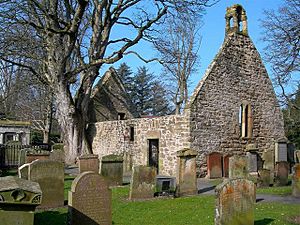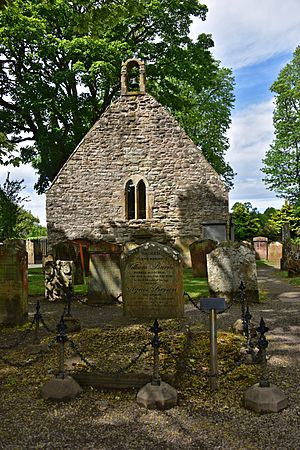Alloway Auld Kirk facts for kids
Quick facts for kids Alloway Auld Kirk |
|
|---|---|
 |
|
| Type | Church |
| Location | Alloway |
| OS grid reference | NS33191805 |
| Built | 16th century |
| Official name: Alloway Kirk | |
| Type | Ecclesiastical: church |
| Designated | 5 July 1927 |
| Reference no. | SM308 |
|
Listed Building – Category B
|
|
| Official name: Alloway Kirk Graveyard including Hughes Mausoleum, Gatepiers, Gates and Boundary Wall and excluding Scheduled Monument No 308, 'Alloway Kirk', Alloway | |
| Designated | 5 February 1971 |
| Reference no. | LB21471 |
| Lua error in Module:Location_map at line 420: attempt to index field 'wikibase' (a nil value). | |
The Alloway Auld Kirk is a ruined church in Alloway, South Ayrshire, Scotland. It was built in the 1500s. Today, it is famous for its role in the spooky poem "Tam o' Shanter" by the famous Scottish poet Robert Burns. In the poem, the church is the setting for a wild dance of witches.
Contents
The Kirk's Connection to Robert Burns
The Alloway Auld Kirk is closely linked to Robert Burns and his family. It is a special place for anyone who loves his poetry.
The Burns Family Graves
The poet's father, William Burnes, is buried in the church's graveyard. His mother, Agnes, is also remembered on the gravestone. William Burnes had lived in Alloway with his family and even tried to take care of the church grounds when it was already a ruin.
The original gravestone wore away over time. The one you can see today has a special tribute written by Robert Burns for his father. The poet's sister, Isabella, is also buried in the graveyard.
Souvenirs from the Kirk
The kirk's connection to Robert Burns made it very famous. People wanted souvenirs from the building. Robert Burns himself gave a special gift to his friend John Richmond. It was a snuffbox (a small box for holding tobacco powder) made from the wooden rafters of the old church.
Another man named David Auld took the rest of the rafters. He used the wood to make chairs and other items to sell. He made a lot of money because so many people wanted a piece of the "haunted" kirk.
Protecting the Historic Kirk
The Alloway Auld Kirk is a very important piece of Scottish history. To make sure it is not lost, it has been protected by the government.
In 2008, after work was done to preserve the ruins, the kirk and graveyard were reopened to the public. The First Minister of Scotland at the time, Alex Salmond, attended the ceremony.
The church is officially a scheduled monument. This means it is a nationally important site protected by law. The graveyard is a Category B listed building, which also gives it special protection. These protections ensure that the kirk will be around for future generations to visit and enjoy.
See also
- List of Church of Scotland parishes
- Scheduled monuments in South Ayrshire


